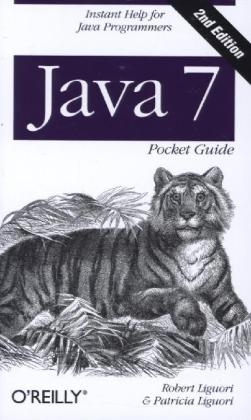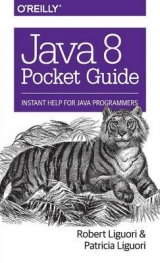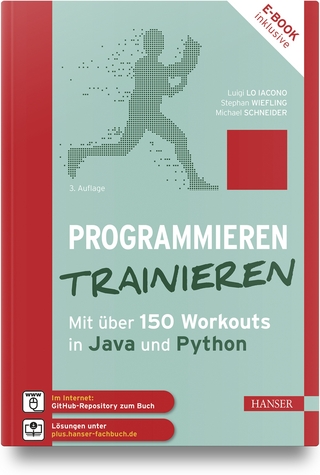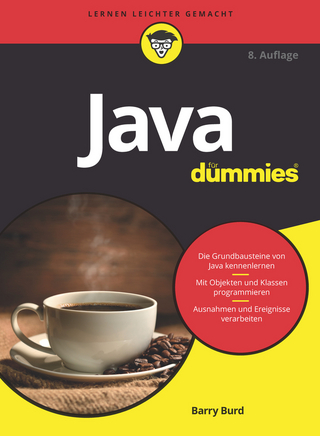
Java 7 Pocket Guide
O'Reilly Media, Inc, USA (Verlag)
978-1-4493-4356-9 (ISBN)
When you need quick answers for developing or debugging Java programs, this pocket guide provides a handy reference to the standard features of the Java programming language and its platform.
You’ll find helpful programming examples, tables, figures, and lists, as well as supplemental information about topics including the Java Scripting API, third-party tools, and the basics of the Unified Modeling Language (UML).
Updated for new features through Java SE 7, this little book is an ideal companion, whether you’re in the office, in the lab, or on the road.
- Quickly find Java language details, such as naming conventions, fundamental types, and object-oriented programming elements
- Get details on the Java SE 7 platform, including development basics, memory management, concurrency, and generics
- Browse through basic information on NIO 2.0, the G1 Garbage Collector, and Project Coin (JSR-334) features
- Get supplemental references to development, CM, and test tools; libraries; IDEs; and Java-related scripting languages
- Find information to help you prepare for the Oracle Certified Associate Java SE 7 Programmer I exam
Robert Liguori an Oracle Certified Java Profession and a software developer / test engineer for several Java-based air traffic management applications.
Patricia Liguori, a multi-disciplinary information systems engineer, has been developing real-time air traffic management systems and aviation related information systems since 1994.
Language
Chapter 1 Naming Conventions
Class Names
Interface Names
Method Names
Instance and Static Variable Names
Parameter and Local Variable Names
Generic Type Parameter Names
Constant Names
Enumeration Names
Package Names
Acronyms
Chapter 2 Lexical Elements
Unicode and ASCII
Comments
Keywords
Identifiers
Separators
Operators
Literals
Escape Sequences
Unicode Currency Symbols
Chapter 3 Fundamental Types
Primitive Types
Literals for Primitive Types
Floating-Point Entities
Numeric Promotion of Primitive Types
Wrapper Classes
Autoboxing and Unboxing
Chapter 4 Reference Types
Comparing Reference Types to Primitive Types
Default Values
Conversion of Reference Types
Converting Between Primitives and Reference Types
Passing Reference Types into Methods
Comparing Reference Types
Copying Reference Types
Memory Allocation and Garbage Collection of Reference Types
Chapter 5 Object-Oriented Programming
Classes and Objects
Variable-Length Argument Lists
Abstract Classes and Abstract Methods
Static Data Members, Static Methods, Static Constants, and Static Initializers
Interfaces
Enumerations
Annotation Types
Chapter 6 Statements and Blocks
Expression Statements
Empty Statement
Blocks
Conditional Statements
Iteration Statements
Transfer of Control
Synchronized Statement
Assert Statement
Exception Handling Statements
Chapter 7 Exception Handling
The Exception Hierarchy
Checked/Unchecked Exceptions and Errors
Common Checked/Unchecked Exceptions and Errors
Exception Handling Keywords
The Exception Handling Process
Defining Your Own Exception Class
Printing Information About Exceptions
Chapter 8 Java Modifiers
Access Modifiers
Other (Nonaccess) Modifiers
Platform
Chapter 9 Java Platform, SE
Common Java SE API Libraries
Chapter 10 Development Basics
Java Runtime Environment
Java Development Kit
Java Program Structure
Command-Line Tools
Classpath
Chapter 11 Memory Management
Garbage Collectors
Memory Management Tools
Command-Line Options
Resizing the JVM Heap
Interfacing with the GC
Chapter 12 Basic Input and Output
Standard Streams in, out, and err
Class Hierarchy for Basic Input and Output
File Reading and Writing
Socket Reading and Writing
Serialization
Zipping and Unzipping Files
File and Directory Handling
Chapter 13 NIO 2.0 Quicklook
The Path Interface
The Files Class
Additional Features
Chapter 14 Concurrency
Creating Threads
Thread States
Thread Priorities
Common Methods
Synchronization
Concurrent Utilities
Chapter 15 Java Collections Framework
The Collection Interface
Implementations
Collection Framework Methods
Collections Class Algorithms
Algorithm Efficiencies
Comparator Interface
Chapter 16 Generics Framework
Generic Classes and Interfaces
Constructors with Generics
Substitution Principle
Type Parameters, Wildcards, and Bounds
The Get and Put Principle
Generic Specialization
Generic Methods in Raw Types
Chapter 17 The Java Scripting API
Scripting Languages
Script Engine Implementations
Setting Up Scripting Languages and Engines
Appendixes
Appendix Third-Party Tools
Development, CM, and Test Tools
Libraries
Integrated Development Environments
Web Application Platforms
Scripting Languages (JSR-223 compatible)
Appendix UML Basics
Class Diagrams
Object Diagrams
Graphical Icon Representation
Connectors
Multiplicity Indicators
Role Names
Class Relationships
Sequence Diagrams
| Zusatzinfo | black & white illustrations, black & white tables, figures |
|---|---|
| Verlagsort | Sebastopol |
| Sprache | englisch |
| Maße | 108 x 178 mm |
| Gewicht | 168 g |
| Einbandart | kartoniert |
| Themenwelt | Informatik ► Programmiersprachen / -werkzeuge ► Java |
| Informatik ► Software Entwicklung ► Objektorientierung | |
| ISBN-10 | 1-4493-4356-2 / 1449343562 |
| ISBN-13 | 978-1-4493-4356-9 / 9781449343569 |
| Zustand | Neuware |
| Haben Sie eine Frage zum Produkt? |
aus dem Bereich



